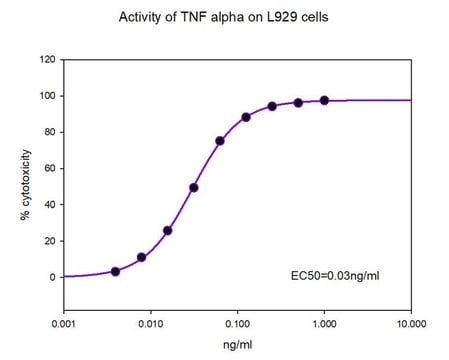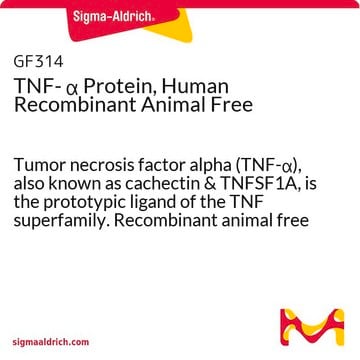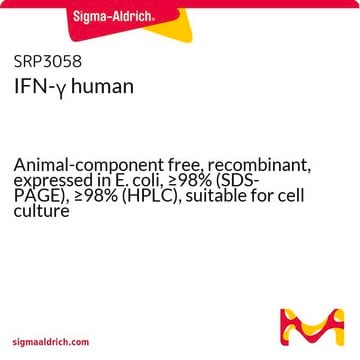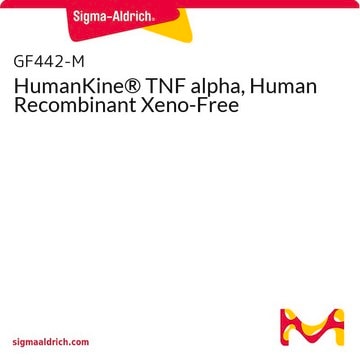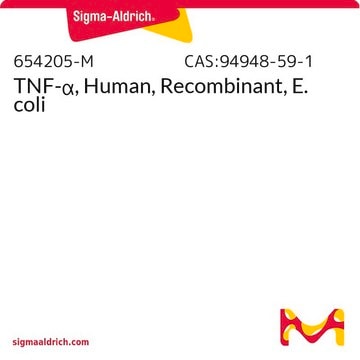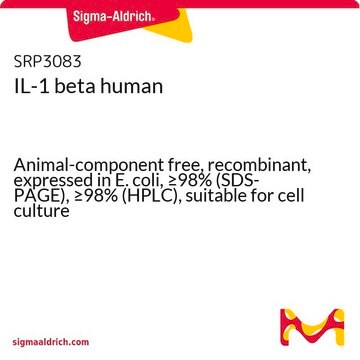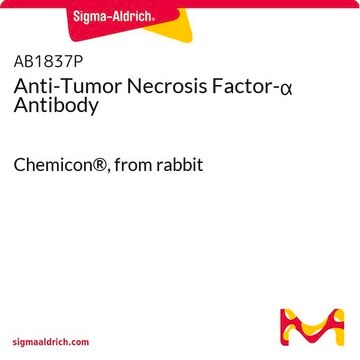GF023
Tumor Necrosis Factor-α Protein, Recombinant human
Tumor Necrosis Factor-alpha (TNF-alpha) is a potent lymphoid factor that exerts cytotoxic effects on a wide range of tumor cells & certain other target cells.
Synonyma:
TNF-alpha
Přihlásitk zobrazení cen stanovených pro organizaci a smluvních cen
About This Item
UNSPSC Code:
12352202
eCl@ss:
32160405
NACRES:
NA.75
Doporučené produkty
biological source
human
Quality Level
assay
>97% (SDS-PAGE)
specific activity
≥2 x 107 U/mg
manufacturer/tradename
Chemicon®
technique(s)
cell culture | mammalian: suitable
input
sample type hematopoietic stem cell(s)
NCBI accession no.
UniProt accession no.
shipped in
dry ice
Gene Information
human ... TNF(7124)
General description
Product Source: E.coli
Tumor Necrosis Factor-alpha (TNF-alpha) is a potent lymphoid factor that exerts cytotoxic effects on a wide range of tumor cells and certain other target cells. The mature form of human TNF-alpha has 157 amino acid residues. GF023 is a recombinant polypeptide containing the mature form of human TNF-a with a polyhistidine tag at its amino terminal.
Application
For most in vitro applications, TNF-alpha exerts its biological activity in the concentration range of 0.05 to 20.0 ng/mL. Responding cells are (partial list): Tumor cells, certain other cells.
Physical form
Lyophilized from 3mM Tris, pH 8.0.
Storage and Stability
The lyophilized powder, though stable at room temperature, is best stored desiccated at -20°C. Reconstitute with sterile distilled water to a concentration of 0.1-1 mg/mL. Note: Allow the reconstituted vial to sit at room temperature for 2 hours before use. This solution can be diluted into other buffered solutions and stored at 4°C for one week or -20°C for future use. Reconstituted TNF-alpha should be stored in undiluted aliquots at -20°C for up to six months.
Analysis Note
Specific Activity: Chemicon′s human TNF-alpha, is fully biologically active when compared to standards.The ED50 as determined by the cytolysis of mouse L929 cells in the presence of Actinomycin-D is ≤ 0.05 ng/mL
Legal Information
CHEMICON is a registered trademark of Merck KGaA, Darmstadt, Germany
Disclaimer
Unless otherwise stated in our catalog or other company documentation accompanying the product(s), our products are intended for research use only and are not to be used for any other purpose, which includes but is not limited to, unauthorized commercial uses, in vitro diagnostic uses, ex vivo or in vivo therapeutic uses or any type of consumption or application to humans or animals.
Storage Class
11 - Combustible Solids
wgk_germany
WGK 3
Osvědčení o analýze (COA)
Vyhledejte osvědčení Osvědčení o analýze (COA) zadáním čísla šarže/dávky těchto produktů. Čísla šarže a dávky lze nalézt na štítku produktu za slovy „Lot“ nebo „Batch“.
Již tento produkt vlastníte?
Dokumenty související s produkty, které jste v minulosti zakoupili, byly za účelem usnadnění shromážděny ve vaší Knihovně dokumentů.
Hangeun Kim et al.
Methods in molecular biology (Clifton, N.J.), 1155, 125-132 (2014-05-03)
Hepatitis C virus (HCV) often causes chronic infection in humans, although the mechanisms for viral chronicity are not clearly understood. Tumor necrosis factor-α (TNF-α)-mediated apoptosis is a key element in a host organism's defense inhibiting viral spread and persistence. HCV
María Angélica Contreras et al.
The Biochemical journal, 477(17), 3299-3311 (2020-09-18)
TNFα is a pro-inflammatory cytokine that is a therapeutic target for inflammatory autoimmune disorders. Thus, TNFα antagonists are successfully used for the treatment of these disorders. Here, new association patterns of rhTNFα and its antagonists Adalimumab and Etanercept are disclosed.
María A Contreras et al.
Proteins, 89(11), 1557-1564 (2021-07-13)
The neutralization of tumor necrosis factor alpha (TNFα) with biopharmaceuticals is a successful therapy for inflammatory diseases. Currently, one of the main TNFα-antagonists is Etanercept, a dimeric TNF-R2 ectodomain. Considering that TNFα and its receptors are homotrimers, we proposed that
Sahar Rafat et al.
Biology, 11(11) (2022-11-12)
Cancer is the utmost common disease-causing death worldwide, characterized by uncontrollable cell division with the potential of metastasis. Overexpression of the Inhibitors of Apoptosis proteins (IAPs) and autophagy correlates with tumorigenesis, therapeutic resistance, and reoccurrence after anticancer therapies. This study
Rojo A Ratsimandresy et al.
Nature communications, 8, 15556-15556 (2017-06-06)
Inflammasomes are protein platforms linking recognition of microbe, pathogen-associated and damage-associated molecular patterns by cytosolic sensory proteins to caspase-1 activation. Caspase-1 promotes pyroptotic cell death and the maturation and secretion of interleukin (IL)-1β and IL-18, which trigger inflammatory responses to
Náš tým vědeckých pracovníků má zkušenosti ve všech oblastech výzkumu, včetně přírodních věd, materiálových věd, chemické syntézy, chromatografie, analytiky a mnoha dalších..
Obraťte se na technický servis.
